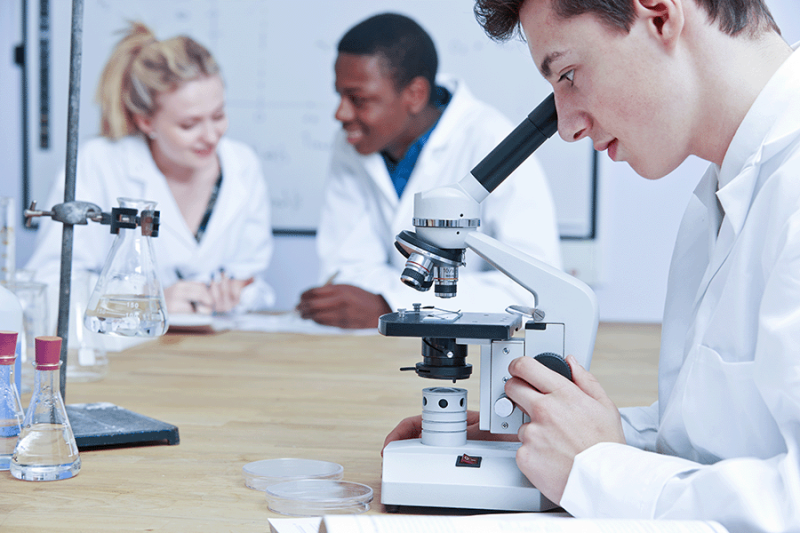
Innovations and Future Solutions
Without chemistry, climate change cannot be solved. The chemical industry is one of the pioneers in innovation and circular economy.
The Paris Climate Agreement, jointly agreed upon by multiple nations, aims to limit the global average temperature rise to 1.5 degrees Celsius. Finland’s objective is to achieve carbon neutrality by the year 2035. This goal entails that the state produces only as much carbon dioxide emissions as it can sequester from the atmosphere. To accomplish this endeavor, the involvement of businesses is necessary.
The chemical industry has embraced this challenge and is striving for carbon neutrality in Finland. Indeed, addressing climate change necessitates the utilization of chemistry. Chemistry is a continuously evolving natural science, and its solutions bear significant importance for both present and future developments. We must acknowledge our role in preserving the diversity of nature.

One person’s waste is another person’s treasure
Circular economy is an economic model in which products and materials are reused for extended periods in a secure manner. Circular economy paves the way towards more sustainable development than the current model, presenting a significant economic opportunity that also revitalizes business models. The chemical industry stands as one of the pioneers in the realm of circular economy.
Bioeconomy and Circular Economy
The development of circular economy requires not only technological advancements but also the evolution of business models and the entire societal system.
Chemistry boasts several strengths, including:
- Molecular-level expertise: enabling the sustainable and intelligent utilization of both virgin and waste-derived raw materials. The objective is not merely recycling but value-adding recycling (upcycling). Chemistry often plays a pivotal role in this, as its core competence involves creating added value for almost any type of raw material.
- Bridge-building skills: the chemical industry is interconnected with all other sectors, providing materials and solutions to them. It’s difficult to identify a value chain in the production of goods where chemistry isn’t involved. As the significance of various ecosystems and value chains grows in the circular economy, chemistry takes on a critical role.
Numerous areas of growth and innovations in chemistry are linked to bioeconomy and circular economy, for instance:
- Biofuels such as renewable diesel, bioethanol, and biogas
- Biobased chemicals like xylitol, carboxymethyl cellulose (CMC), starch derivatives, industrial enzymes, and chemistry products derived from pine oil used in paints, adhesives, and animal feed
- Solutions related to water purification and water footprint optimization
- Fertilizers and nutrients
- Waste material processing technologies, including the production of recycled plastics.
Because the chemical industry is involved in nearly all value chains of goods production in some way, chemical innovations also accelerate the transformation of other industries. For example, an auxiliary substance derived from pine oil can enhance asphalt recycling, appropriate chemistry can save materials in cardboard production, or by using suitable chemistry, byproducts from the food industry can be utilized in cosmetics manufacturing.
The chemical industry encompasses various companies, some of which use renewable, some fossil, and some mineral raw materials. Circular economy concerns all companies and is already a fundamental part of many businesses.
In Finland and Europe, numerous research, development, and innovation (RDI) projects related to bioeconomy and circular economy are underway. Besides technological development, it’s also crucial to foster new ways of collaboration and business models, including integrating services more closely with products and establishing various collaboration platforms and ecosystems. Many companies in the chemical sector invest significantly in RDI activities.

Chemistry: the most innovative field in the world
Substitution of fossil fuels, production of carbon-neutral sustenance, pharmaceuticals, clean water – all of these are within the realm of chemistry.
Were you aware that chemistry is involved, among other things, in the background of these solutions?
The molecule darolutamide, developed by Orion Pharma in collaboration with Bayer, featuring a novel structure, addresses the need for discovering novel approaches to the treatment of prostate cancer. Prostate cancer is the second most common cancer among men worldwide. This medication is designed for the treatment of non-metastatic castration-resistant prostate cancer.
The peracetic acid (Performic Acid, PFA) developed by Kemira is chlorine-free and biodegradable, setting it apart from almost all other available disinfectants. The rapidly reactive PFA product leaves behind only water, carbon dioxide, and a small amount of biodegradable formic acid. Water treated with PFA can be safely discharged into aquatic environments. PFA has been developed within Kemira’s Finnish research centers, with collaborations involving multiple companies and universities.
The Mirena hormone intrauterine device (IUD) stands as one of the most successful products within the Finnish pharmaceutical industry. This contraceptive product was developed approximately three decades ago at the Leiras factory in Turku. The factory is now a part of the international Bayer Group. Presently, Mirena hormone IUDs are exported to more than 130 countries.
The Progres® feed ingredient, derived from pine oil by Forchem and Hankkija, addresses the global demand to replace feed antibiotics in livestock production. Concurrently, it promotes the sustainability of livestock production and the purity of food products.
The diagnosis of celiac disease typically requires a blood test and, if necessary, endoscopy with the collection of a biopsy from the small intestine. Finnish company Biohit Oy has developed a rapid test that enables the detection of celiac disease from a fingertip blood sample. This innovation has the potential to facilitate and expedite the diagnosis of celiac disease while also reducing healthcare costs.
St1 Ltd utilizes a novel methodology to produce ethanol from waste raw materials, which is subsequently employed as a transportation fuel. This innovative solution contributes to the reduction of carbon dioxide emissions from the transportation sector and diminishes society’s dependency on oil. In addition to ethanol, the process generates valuable by-products that can be further utilized, including animal feed, fertilizers, or solid biofuels.
Ammonium chloride imparts the distinctive salty flavor to salmiakki, or salty licorice. In fact, ammonium chloride is naturally white, but in confectionery, it is blackened using medicinal charcoal. A significant portion of the ammonium chloride employed by Finnish confectioneries originates from the production facilities of BASF, a chemical company based in Germany, where its manufacturing was initiated in 1917.
Have you recently examined the freezer bag in your hand more closely? Freezer vegetable bags are, in fact, made of polyethylene, which is a durable and moisture-resistant versatile material. Polyethylene is produced at Borealis production facilities in Kilpilampi, Porvoo. Since the 1990s, the company has been developing its own Borstar technology, which is among the most advanced in its field worldwide.
